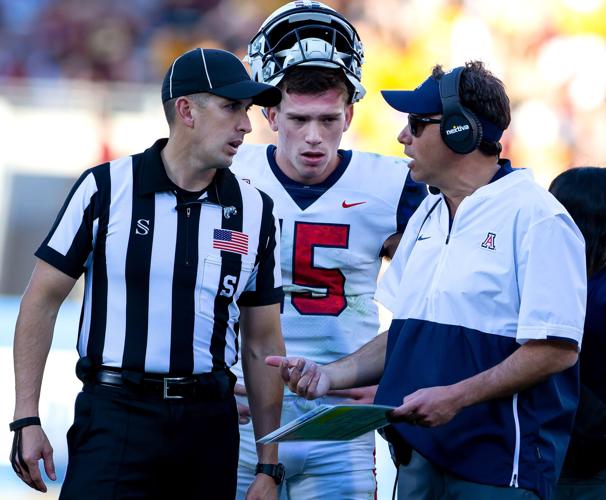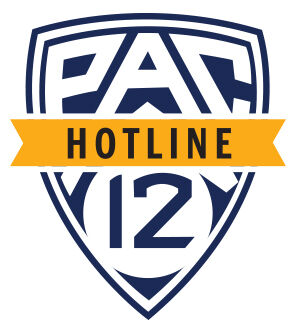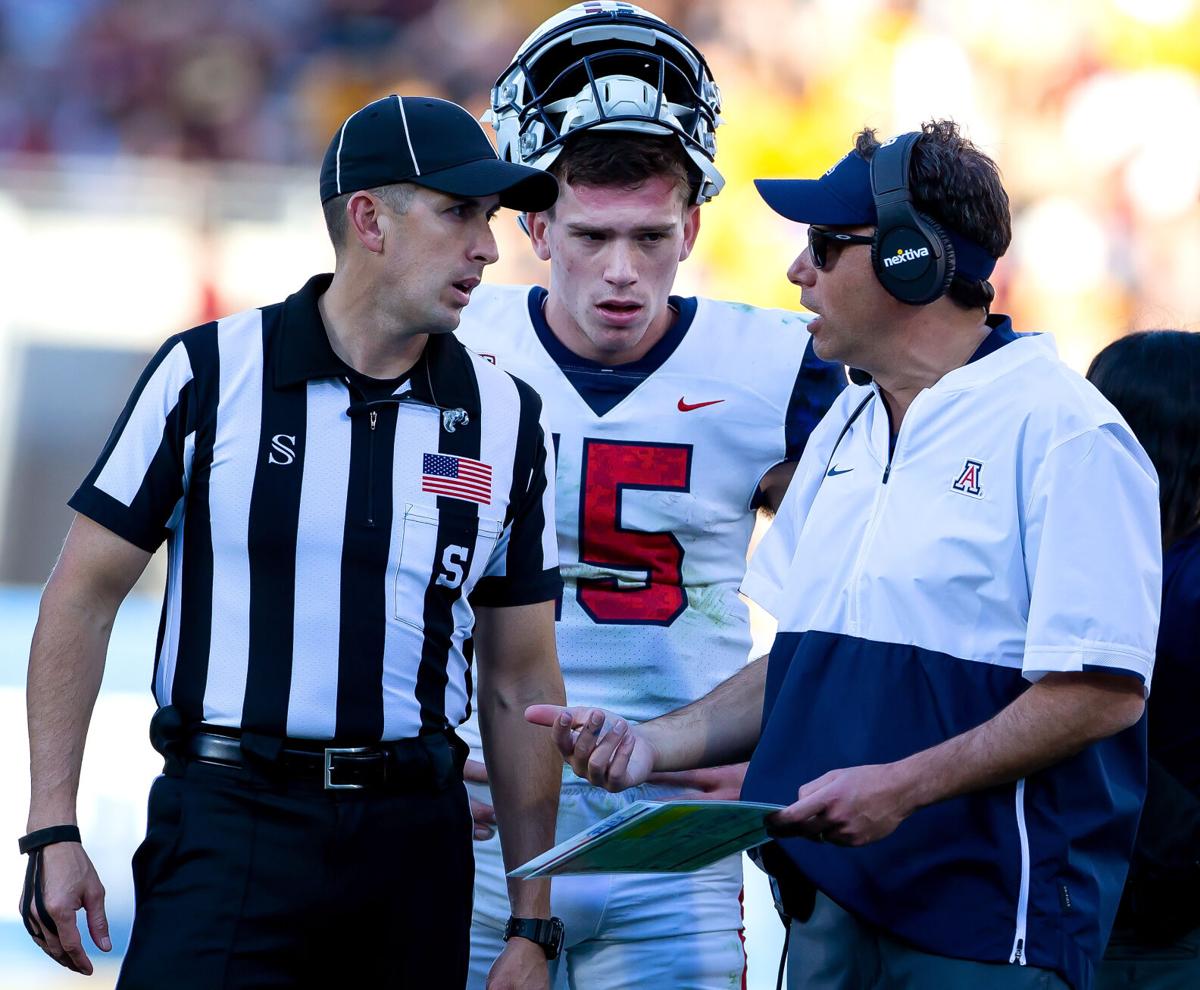The gaffe was deeply regrettable, the subsequent furor entirely predictable:
An intentional grounding call on first down followed by a missed second down, then a punt on what should have been third down and, eventually, a public admission of error by the conference office and scorn from coast to coast.
The situation would have been an abject embarrassment for the Pac-12, except that what we described above happened to the SEC, during a major intersectional showdown between Auburn and Penn State early last season.
That’s right. A gaffe nearly identical to what occurred in the Washington State-Oregon game last weekend struck SEC officials in September 2021 and left Penn State coach James Franklin apoplectic.
At least the Pac-12 corrected its mistake Saturday during the ensuing media timeout and gave Washington State a second chance to complete third down. SEC officials never gave the Nittany Lions a mulligan.
After the game, the conference office offered a public mea culpa — just as the Pac-12 did Sunday when it admitted “a mistake was made with the down indicator” in Pullman.
Major blunders happen in other conferences, too.
Pac-12 officiating is back in the news after the embarrassing sequence, sparking memories of past scandals and sucking attention away from the better-than-expected on-field product.
The conference has four teams — USC, Utah, Washington and Oregon — in the top 15 of the Associated Press poll for the first time since November 2016 and is well positioned for a series of marquee matchups in October. Yet coming out of Week 4, officiating was the hottest topic.
The consensus among fans across the footprint: It still stinks.
Allow the Hotline to respectfully disagree.
Just 21 months ago, we published a two-part series about the awful state of officiating in the conference.
But in the interest of calling ’em like we see ’em, here’s another public admission: Pac-12 officiating has improved substantially in the past two seasons.
Is it perfect? Nope.
Is it as good as it can be? Nope.
Is it any worse than officiating in other Power Five conferences? Nope.
The Pac-12’s replay review process is faster; communication between officials and the teams (and viewing audience) is better; there are fewer bad holding penalties and errant pass interference calls; and targeting controversies, which used to be frequent, are rare.
Also, there are fewer instances of abject, mystifying incompetence — situations that require the conference office to publicly admit a mistake.
The improvement can all be traced to Sept. 21, 2018 and the infamous instant replay scandal that rocked the conference and sparked the beginning of the end of Larry Scott’s tenure as commissioner.
Remember the targeting call on USC (against Washington State) that was changed after the Pac-12’s general counsel, Woodie Dixon, who was not a trained official, called into the command center and voiced his opinion.
The subsequent Yahoo report and intra-conference outrage forced Scott, who created the process by which a career attorney was involved in replay decisions, to agree to hire an outside consulting firm, Sibson, to evaluate officiating.
Months later, the conference announced Sibson’s recommendations, which included a push toward transparency.
Starting with the 2019 season, the Pac-12 would publicly acknowledge officiating mistakes when:
A game-ending call or no-call impacts the result of the game;
A call involves a significant error in officiating mechanics;
A call involves an error in rules interpretation;
Other extraordinary circumstances
Put another way: There are bad calls and there are egregiously bad calls — the former fall within the normal range of mistakes that occur in every conference; the latter fall outside the acceptable range and would necessitate a public admission of error.
It didn’t take long for the mea culpas to start streaming out of San Francisco:
On the third Saturday of the 2019 season, the conference admitted its officials bungled a call at the end of the Arizona State-Michigan State game that impacted the outcome.
A week later, inaction by officials at the end of the Cal-Mississippi game prompted another statement.
In November, the conference acknowledged officials incorrectly assessed a penalty on Washington State — it should have been marked off against Cal — that ended up costing the Cougars 57 yards in field position.
In three months, Pac-12 officials had committed three gaffes that were outside the acceptable range of human error. The transparency was great. So was the incompetence.
One reason nothing changed despite the Sibson report: The men responsible for the deterioration of Pac-12 football — Scott at the top of the conference org chart, Dixon in charge of the officiating program and overall football product — were allowed to remain on the job.
The following summer, Dixon left the conference and Scott smartly hired a football operations chief who actually understood football: Merton Hanks, the former All-Pro safety and Super Bowl winner.
Hanks spent his first season, the COVID season, assessing the football product and realized major changes were needed.
Then Scott’s contract was not renewed, George Kliavkoff took over, and the speed of change accelerated.
Last summer, Hanks hired Shonna Brown as associate commissioner for football operations. Her background in analytics and strategy has freed Hanks to work closely with David Coleman, who oversees the officiating program. Hanks also added personnel to the instant replay command center and upgraded the technology.
By the start of the 2021 season, the football operation had been modernized.
“We challenged the officials,” Hanks said at the end of the 2021 season. “We put a few on notice that they had to improve or they would need to move on. They answered the call.”
How do we know?
There are small pieces of evidence. For example, the Pac-12 is averaging 13 penalties per game this season, lowest in the Power Five. And through the first three weeks, the conference’s average time-of-game was just 3:10, down four minutes from last year.
But the best measure of post-pandemic improvement is the decrease in public mea culpas and/or outright scandals.
The dumpster fire of 2018 was followed by three public admissions in 2019. But in the two-plus seasons since then, there has been just one: following the gaffe last weekend in Pullman.
Meanwhile, other Power Five conferences have had their fair share.
Not all leagues are as transparent as the Pac-12, but we have made our best effort to track down any instance of egregious, news-making mistakes.

2019
Big 12 officials botched an illegal snap call that impacted the outcome of the Baylor-Texas Tech game, according to TTU athletic director Kirby Hocutt, who was then fined by the conference for talking publicly about the situation.
The ACC admitted its officials bungled a call on the final play of the North Carolina-Wake Forest game, costing UNC a chance to win.
2020
The SEC acknowledged an error at the end of the Mississippi-Auburn game that affected the outcome. Rebels coach Lane Kiffin was later slapped with a $25,000 fine for his response to the situation on social media.
The Big 12 admitted that officials incorrectly added 39 seconds to the end of the Texas-Oklahoma game.
2021
The SEC admitted the missed down in the Auburn-Penn State game.
The SEC acknowledged officials bungled a punt return that impacted the outcome of the Memphis-Mississippi game.
The Big Ten privately admitted a mistake in the Michigan-Michigan State game that affected a touchdown, according to Wolverines coach Jim Harbaugh.
The Big Ten acknowledged officials missed a targeting call that impacted the outcome of the Minnesota-Ohio State game.
Which brings us to the 2022 season, and the state of affairs in the Pac-12.
An egregious mistake occurred in Week 3, when a phantom offside call on Cal negated an errant field goal by Notre Dame. With the second chance they should never have received, the Irish scored a touchdown in what became a seven-point win.
But that wasn’t a Pac-12 crew; ACC officials worked the game. And based on conference policy, the ACC has not publicly acknowledged the error.
One week later, a Pac-12 crew missed the down in Pullman and the conference swiftly offered the mea culpa.
(Why didn’t officials allow WSU to replay second down, which was skipped initially, as well as third? Because that would have given the Cougars five downs: one first, one second, two thirds and a fourth.)
The situation prompted a group of former Pac-12 officials to circulate an email, according to Portland-based columnist John Canzano, as he detailed on “Canzano and Wilner: The Podcast,” in which one of them commented, “Not a good week for all our football officials.”
That’s indisputable. Missing a down is on the short list of colossal errors. But there’s also no denying that egregious mistakes happen in other conferences, too.
After all, the mighty SEC has experienced more gigantic gaffes than the Pac-12 in the past two years, based on the number of public acknowledgments from the conference office.
From here, it’s clear: Pac-12 officiating is on par with that of any Power Five league.
And that, folks, constitutes a major step forward.






